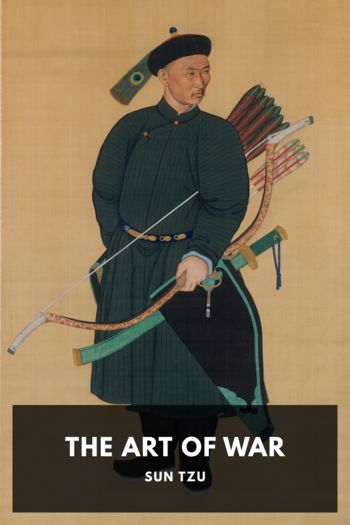The Art of War by Sun Tzu (elon musk reading list TXT) 📕

- Author: Sun Tzu
Book online «The Art of War by Sun Tzu (elon musk reading list TXT) 📕». Author Sun Tzu
Isolating him from his allies. We must not forget that Sun Tzǔ, in speaking of hostilities, always has in mind the numerous states or principalities into which the China of his day was split up. ↩
When he is already in full strength. ↩
The use of the word 政 is somewhat unusual, which may account for the reading of the modern text: 其下攻城. ↩
Another sound piece of military theory. Had the Boers acted upon it in 1899, and refrained from dissipating their strength before Kimberley, Mafeking, or even Ladysmith, it is more than probable that they would have been masters of the situation before the British were ready seriously to oppose them. ↩
It is not quite clear what 櫓 were. Tsʽao Kung simply defines them as 大楯 “large shields,” but we get a better idea of them from Li Chʽüan, who says they were to protect the heads of those who were assaulting the city walls at close quarters. This seems to suggest a sort of Roman testudo, ready made. Tu Mu says they were “what are now termed 彭排” (wheeled vehicles used in repelling attacks, according to Kʽang Hsi), but this is denied by Chʽên Hao. See supra, II (“… spears and shields …”). The name is also applied to turrets on city walls. Of 轒轀 (fên yün) we get a fairly clear description from several commentators. They were wooden missile-proof structures on four wheels, propelled from within, covered over with raw hides, and used in seiges to convey parties of men to and from the walls, for the purpose of filling up the encircling moat with earth. Tu Mu adds that they are now called 木驢 “wooden donkeys.” Capt. Calthrop wrongly translates the term, “battering-rams.” I follow Tsʽao Kung in taking 具 as a verb, coordinate and synonymous with 修. Those commentators who regard 修 as an adjective equivalent to 長 “long,” make 具 presumably into a noun. ↩
The 距闉 (or 堙, in the modern text) were great mounds or ramparts of earth heaped up to the level of the enemy’s walls in order to discover the weak parts in the defence, and also to destroy the 樓櫓 fortified turrets mentioned in the preceding note. Tu Yu quotes the Tso Chuan: 楚司馬子反乘堙而窺宋城也. ↩
Capt. Calthrop unaccountably omits this vivid simile, which, as Tsʽao Kung says, is taken from the spectacle of an army of ants climbing a wall. The meaning is that the general, losing patience at the long delay, may make a premature attempt to storm the place before his engines of war are ready. ↩
We are reminded of the terrible losses of the Japanese before Port Arthur, in the most recent siege which history has to record. The Tʽung Tien reads 不勝心之忿 … 則殺士卒 … 攻城之災. For 其忿 the Yü Lan has 心怒. Capt. Calthrop does not translate 而城不拔者, and mistranslates 此攻之災. ↩
Chia Lin notes that he only overthrows the 國, that is, the Government, but does no harm to individuals. The classical instance is Wu Wang, who after having put an end to the Yin dynasty was acclaimed “Father and mother of the people.” ↩
Owing to the double meanings of 兵, 頓 (= 鈍) and 利, the latter part of the sentence is susceptible of quite a different meaning: “And thus, the weapon not being blunted by use, its keenness remains perfect.” Chang Yü says that 利 is “the advantage of a prosperous kingdom and a strong army.” ↩
Straightaway, without waiting for any further advantage. ↩
Note that 之 does not refer to the enemy, as in the two preceding clauses. This sudden change of object is quite common in Chinese. Tu Mu takes exception to the saying; and at first sight, indeed, it appears to violate a fundamental principle of war. Tsʽao Kung, however, gives a clue to Sun Tzǔ’s meaning: 以二敵一則一術為正一術為奇 “Being two to the enemy’s one, we may use one part of our army in the regular way, and the other for some special diversion.” (For explanation of 正 and 奇, see note 275.) Chang Yü thus further elucidates the point: “If our force is twice as numerous as that of the enemy, it should be split up into two divisions, one to meet the enemy in front, and one to fall upon his rear; if he replies to the frontal attack, he may be crushed from behind; if to the rearward attack, he may be crushed in front. This is what is meant by saying that ‘one part may be used in the regular way, and the other for some special diversion.’ Tu Mu does not understand that dividing one’s army is simply an irregular, just as concentrating it is the regular, strategical method, and he is too hasty in calling this a mistake.” ↩
Li Chʽüan, followed by Ho Shih, gives the following paraphrase: 主客力敵惟善者戰 “If attackers and attacked are equally matched in strength, only the able general will fight.” He thus takes 能 as though it were





Comments (0)